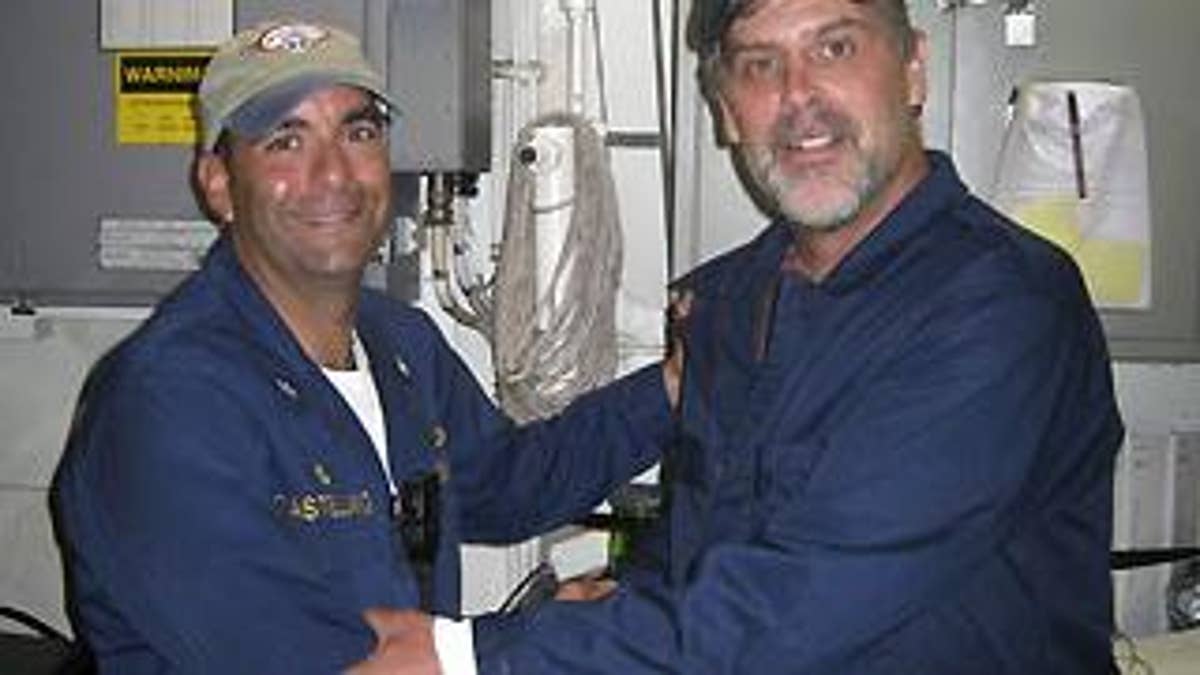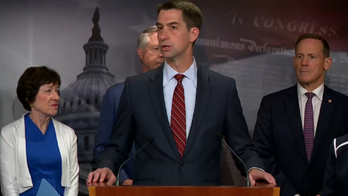
President Obama and U.S. lawmakers on Monday praised the weekend operation of U.S. Navy SEALS responsible for the rescue of Capt. Richard Phillips, who was taken hostage when his freighter ship, the Maersk Alabama, was hijacked by pirates off the coast of Somalia last week.
"I am very proud of the efforts of the U.S. military and the many other departments and agencies that worked tirelessly to resolve this situation," Obama said at the Department of Transportation.
"I share our nation's admiration for Captain Phillips' courage and leadership and selfless concern for his crew and I want to be very clear that we are resolved to halt the rise of (piracy) in that region, and to achieve that goal we're going have to continue to work with our partners to prevent future attacks and we have to continue to be prepared to confront them when they arise, we have to ensure those who commit acts of piracy are held accountable."
"Captain Phillips' rescue in particular demonstrates the Navy SEALS' extraordinary capability to conduct complex and sensitive operations," said House Armed Services Committee Chairman Ike Skelton, D-Mo.
"As long as safe havens exist along the Somali coast, we should expect this criminal piracy to continue. The international community must come together, take a good look at our options and seriously consider what can be done to eliminate the threat. We cannot allow the criminals who threaten the safety of the seas to remain unchallenged," Skelton said.'
With the immediate threat to the Maersk crew over, a Department of Defense official told FOX News that contingency planning is now under way on a variety of possible military operations and it would not be unreasonable to assume action against pirate camps might be one of those operations.
"We never talk about future possible operations and we're not going to start now," Pentagon spokesman Bryan Whitman said.
Neither the official who spoke to FOX News nor Whitman would outright deny that planning is under way, however several Pentagon officials appear wary of getting into a military engagement in Somalia at this time.
Whiteman said such the successful end to the standoff could discourage future attacks but some members of the shipping industry worry that "if they were armed it could cause escalation."
"If the last couple of days have taught us anything, it reinforces the fact that this is a complicated and serious international problem that needs to be addressed broadly. ... This is not a problem that can be solved entirely from the sea. And this is not a problem that can be entirely solved through military means," he said.
While the Navy is being credited with a successful rescue, others have blamed the growth in piracy in part on the U.S. government. The U.S. African Chamber of Commerce sent a letter to President Obama and Secretary of State Hillary Clinton on Monday urging them to shepherd action through NATO, the European Union and the African Union to demand that ships entering Somalia and East African waters "be held accountable for truthful registration, declaration of exports, and payment of applicable taxes."
"The explosion of piracy and illegal activity off of the coast of Somalia in recent years began with the U.S. supported overthrow of the Somali government by Ethiopia," USACC President Martin Mohammad wrote. "The previous government provided Somalia with rule of law and a functional society. Since it was overthrown, Somalia's new central government has struggled to maintain the rule of law and the economic infrastructure has severely broken down, leaving the people of Somalia in dire conditions. It has also left the Somali coast unprotected."
Sen. Russ Feingold, D-Wis., offered his praised of the military but also said that piracy had long been neglected by the Bush administration.
"I am elated by the safe rescue of Captain Richard Phillips and the crew of the Maersk Alabama and I thank and congratulate the Navy SEALS and others whose remarkable efforts resulted in a successful end to this troubling situation," Feingold said. "While the episode involving the crew of the Maersk Alabama had a happy ending, piracy off the coast of Somalia will assuredly continue since it is a symptom of the state collapse in Somalia, which presents a much greater and more dangerous problem. For years, Somalia's growing instability was neglected by the Bush administration and the international community. The new administration must not make the same mistake."
Mohammad said Clinton and Obama should push efforts to work with the international community in coordination with the people of Somalia to address the illegal entry of international vessels into Somali waters as much as curbing piracy.
The pirates who boarded the Maersk last Wednesday were quickly overthrown by the crew of the U.S.-flagged merchant ship. However, Phillips was captured and held in a lifeboat during the revolt. He tried to escape once but was recaptured by his four captives.
As the seas got rough on Sunday, the lifeboat, which was out of fuel, agreed to be towed by the USS Bainbridge, a Navy ship that was monitoring the situation.
By that time, the youngest of the pirates, identified as not older than 16, had boarded the larger vessel and surrendered. When Navy SEALS heard gunshots coming from the lifeboat, they were able to get clear views of the pirates and took three direct kill shots to each of the pirates' heads.
A diplomatic source told FOX News that the U.S. government is now weighing three options when it comes to handling the young pirate.
The Navy could either bring him to the U.S. to face federal charges there, hand him over to Kenyan authorities for prosecution. The U.S. and Kenya have a memo of understanding regarding the prosecution of pirates.
Another option is to repatriate him to Somali authorities. The northeast region of Puntland, which has a semblance of authority in the otherwise largely ungoverned country, has taken pirates in the past.




